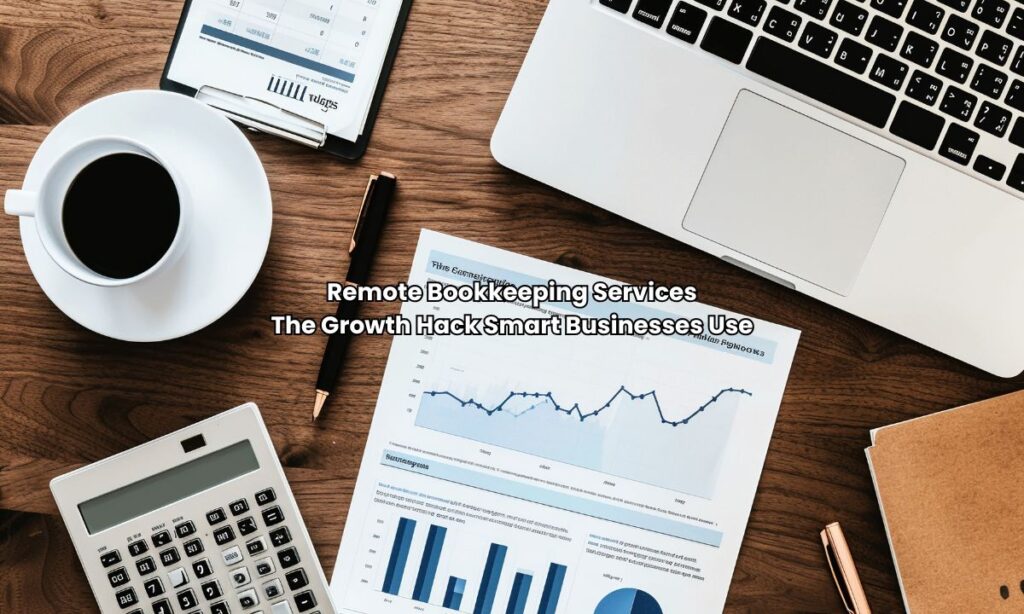The Problem with Traditional Bookkeeping in Today’s Business World
Remember when bookkeeping meant stacks of paper receipts, manual ledger entries, and quarterly visits from your accountant? Those days are gone—or at least they should be. In our digital-first business environment, traditional bookkeeping methods are creating unnecessary bottlenecks for growing companies.
Consider this: A recent survey by Small Business Trends found that 60% of business owners spend more than 80 hours annually just managing receipts and expense tracking. That’s two full work weeks wasted on administrative tasks rather than growth initiatives.
This is precisely why remote bookkeeping services have emerged as a transformative solution for modern businesses. By combining cloud technology with professional financial expertise, these services eliminate the headaches of traditional bookkeeping while providing real-time financial visibility—exactly what growing companies need to make smart, timely decisions.
What Are Remote Bookkeeping Services?
What is remote bookkeeping?
Remote bookkeeping refers to professional financial management services delivered virtually through cloud-based platforms. Instead of working with a local bookkeeper who comes to your office, you collaborate with financial experts who securely access your books online from anywhere.
These services typically include:
- Daily transaction recording and categorization
- Bank and credit card reconciliations
- Accounts payable and receivable management
- Financial reporting and analysis
- Payroll processing support
The key differentiator? Everything happens in the cloud using platforms like QuickBooks Online or Xero, giving you 24/7 access to your financial data while ensuring your records are always up-to-date.
Is remote bookkeeping secure for small businesses?
This common concern stems from understandable caution about financial data. However, reputable remote bookkeeping services actually provide better security than most traditional methods through:
- Bank-level 256-bit encryption for all data
- Multi-factor authentication requirements
- Regular automated backups
- Secure document sharing portals
- SOC 2 compliant data centers
When you work with established providers, your financial information is often more protected than in a physical filing cabinet or local server.
Why Remote Bookkeeping Matters for Growing Businesses

Growing companies face unique financial management challenges that traditional bookkeeping struggles to address:
1. The Scaling Problem
Your bookkeeping needs at 500Krevenuedifferdramaticallyfrom500Krevenuedifferdramaticallyfrom5M revenue. Outsourced bookkeeping solutions scale seamlessly, eliminating the painful process of hiring and training new staff as you grow.
2. The Expertise Gap
Most small businesses can’t afford a full-time CFO, but need more strategic insight than basic data entry provides. Remote services give you access to financial professionals who can:
- Identify cash flow trends
- Recommend process improvements
- Provide industry-specific best practices
3. The Technology Advantage
Modern businesses run on real-time data. Cloud-based bookkeeping integrates with your other systems (POS, eCommerce, payroll) to provide:
- Instant financial snapshots
- Automated data flows between systems
- Customizable dashboards showing KPIs
4. The Cost Reality
Hiring an in-house bookkeeper costs 40,000−40,000−60,000 annually (plus benefits and software). Quality virtual bookkeeping for small businesses typically runs 300−300−800/month—saving 50-70% while often providing better service.
How Cloud-Based Bookkeeping Works in Practice
Understanding the workflow helps demystify the process:
- Connect Your Financial Accounts
- Bank/credit card feeds connect directly to your accounting software
- Transactions flow in automatically daily
- Automated Categorization
- Rules learn to classify recurring transactions
- Bookkeepers review and adjust as needed
- Regular Reconciliation
- Accounts reconciled weekly or monthly
- Discrepancies flagged and resolved
- Reporting and Analysis
- Standard financial statements generated
- Custom reports available on-demand
- Collaborative Review
- Monthly or quarterly financial reviews
- Strategic recommendations provided
Essential Tools Powering Modern Remote Bookkeeping

The best remote bookkeeping services leverage these industry-standard tools:
Core Accounting Platforms
- QuickBooks Online: The small business gold standard
- Xero: Excellent for inventory-heavy businesses
- FreshBooks: Great for service-based companies
Automation Boosters
- Bill.com: AP/AR automation
- Receipt Bank: Smart expense capture
- Gusto: Integrated payroll processing
Security Infrastructure
- LastPass Enterprise: Secure credential management
- Egnyte: Protected file sharing
- Duo: Multi-factor authentication
Real-World Impact: A Retailer’s Success Story
Business Profile:
- $1.8M annual revenue home goods retailer
- 5 physical locations + eCommerce
- Previous bookkeeping: Owner’s spouse + local CPA
Challenges:
- 2-week lag in financial visibility
- Frequent inventory accounting errors
- Monthly bookkeeping costs exceeding $3,500
Remote Bookkeeping Solution:
- Implemented QuickBooks Online with inventory tracking
- Connected all bank/credit card accounts
- Automated expense categorization
- Established weekly cash flow reporting
Results After 6 Months:
- Reduced bookkeeping costs by 42%
- Cut financial close time from 15 days to 3 days
- Identified $28,000 in duplicate vendor payments
- Improved inventory turnover through better reporting
7 Critical Questions to Ask Potential Providers
Before hiring a remote bookkeeping service, ask:
- What’s your experience with businesses in my industry?
(Industry-specific knowledge matters) - Which accounting platforms do you specialize in?
(Look for certified experts in your preferred software) - How do you ensure data accuracy?
(Should include reconciliation processes and review layers) - What security protocols do you have in place?
(Minimum: encryption, MFA, and regular audits) - What’s included in your standard package?
(Clarify services vs. add-ons) - How will we communicate and collaborate?
(Preferred channels and response times) - Can you provide references from similar clients?
(Talk to their current customers)
For more guidance on evaluating providers, see our comprehensive remote financial services guide.
Making the Switch: What to Expect
Transitioning to remote bookkeeping typically follows this timeline:
Week 1-2:
- Initial consultation and needs assessment
- Software setup and account connections
- Historical data migration
Week 3-4:
- Process documentation created
- Team training (if applicable)
- First round of reconciliations
Month 2+:
- Regular reporting cadence established
- Ongoing process optimization
- Strategic financial reviews
Most businesses see measurable benefits within the first 60-90 days.
The Bottom Line for Growing Businesses
The question isn’t whether your business can benefit from remote bookkeeping services—it’s how much you’re losing by not using them. The combination of professional expertise, cloud technology, and cost efficiency creates an undeniable advantage for growth-focused companies.
Ready to transform your financial management? Get started with Remote Financial Services today and discover how modern bookkeeping can fuel your growth.
Take the Next Step
Schedule a free consultation to discuss how our remote bookkeeping services can:
- Reduce your accounting costs by 30-50%
- Provide real-time financial visibility
- Free your team to focus on growth
By embracing remote bookkeeping services, you’re not just outsourcing a task—you’re upgrading your financial operations to match the pace and potential of your growing business. The competitive advantage is clear, and the time to act is now.

